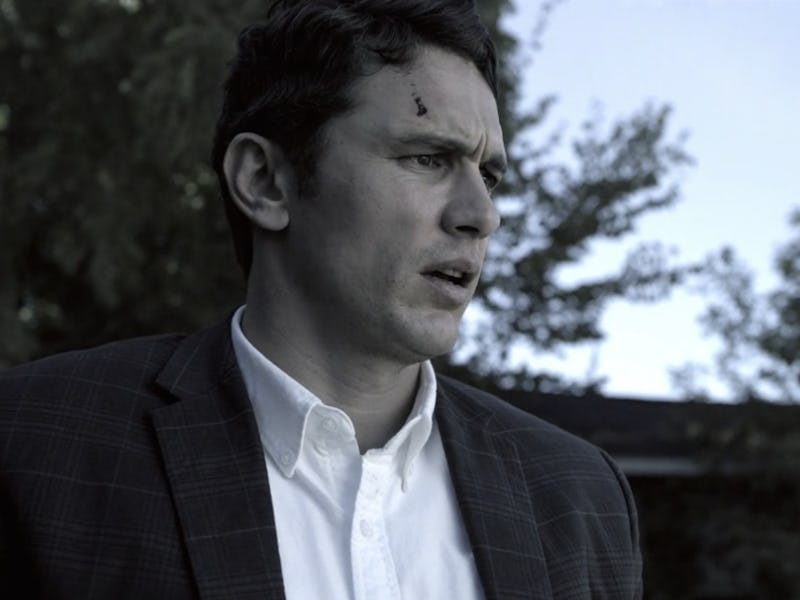JFK Heralds the Apocalypse, Not Camelot, in '11.22.63' Series Finale
In the show's final episode, Jake follows through with his mission, but the results are disastrous.

Three long years later, we’ve finally made it: The final episode of 11.22.63 literally hits the ground running on the series’ titular date. Jake (James Franco) and Sadie (Sarah Gadon) are racing through Dallas on foot, minutes away from their final showdown with Lee Harvey Oswald at the Book Repository. History has never pushed back this furiously: it’s locking doors, crashing cars, and reviving a succession of ghosts — Frank Dunning (Josh Duhamel), Johnny Clayton (T.R. Knight), and a very pissed-off Bill (George MacKay) — to ensure Lee Harvey Oswald (Daniel Webber) gets his shot at JFK. But Jake powers through, riding out his mission to its President-saving end, though he kills Lee and his beloved Sadie in the process. He’s succeeded in changing the past. But what does that mean for the present?
11.22.63 is, in some respects, a misleading title; JFK’s thwarted assassination was never going to be the real climax of the show. This has never been so obvious as in this episode, in which the big event happens over a quarter of the way in. What really makes “The Day in Question” interesting are the days ahead.
Watching a heartbroken and purposeless Jake step back through the rabbit hole into present-day Lisbon, Maine, we get what we were waiting for, and it ain’t pretty: JFK didn’t turn America into Camelot; he turned it into a post-apocalyptic wasteland. As Jake tries to make sense of the wild dogs and gangs of bandits roaming the gray streets, he runs into a familiar face: his old friend Harry Dunning (Leon Rippy) — whose father Jake killed back in the second episode — who explains that JFK’s two-term presidency led to riots, bombings, and concentration camps. “I thought JFK would’ve made things better,” Jake says. Harry, hardened by violence and clearly no better off after Jake’s intervention, resignedly replies, “You don’t understand this world.”
What world is left for Jake to understand? He was listless in the present, but he was a shell in the past; and in the new present, it’s unlikely he’d even survive a night. “I have to reset it,” he says, falling right back into technicolor 1960, where that old pink Cadillac drives by, just like in the pilot. But this time around, we recognize who’s in the back seat: a carefree (and very much alive) Sadie, blissfully oblivious to Jake’s existence.
Their heartbreaking reacquaintance is a turning point for Jake, who’s always been the show’s most frustrating character because he’s never quite felt complete. While his presence has always been intensely felt — throughout the series, he’s given both the mission and his deepening relationships with Harry, Bill, and Sadie his all — you couldn’t help but question the forces behind that intensity. You might chalk that nagging sense of inauthenticity to Franco’s occasionally smirking performance, but maybe what it boils down to is the fact that Jake, as a character, is incomplete until his mission is over. But as he releases Sadie’s gloved hand for the last time, realizing that the only way to save her life is to let her go, you sense him allowing the Yellow Card Man’s (Kevin J. O’Connor) fateful words — “You can’t change the past.” — finally sink in, giving his character a depth and heft we’ve been waiting for throughout the series.
11.22.63 was never going to be a series about time travel. The final scene, where present-day Jake spins an aged but luminous Sadie (played by the enchanting Constance Towers) on the Jodie High School gymnasium floor, drives home the fact that the entire show was, for better or worse, an eight-episode love story. While there’s certainly a sense that we were short-changed — the storylines involving Bill, Deke and Miz Mimi, and Lee all seem like red herrings now — the conclusion it comes to still feels satisfying. And that’s because the show, amid its occasionally goofy melodramatics, inconsistent plot devices, and oddly paced episodes, has excelled at its ability to explore relationships — and, as the bittersweet final scene beautifully illustrates — their ability to transcend time travel altogether.